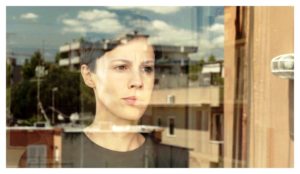Article by: Alessia Durante
Translation by: Maria Elisa Catalano
Probably, only Valerio Mastandrea could title Ride (which means ‘to laugh’ in Italian) a film about pain and mourning: a title which becomes caustic and, as he declared during the press conference, a little paradoxical too. Especially considering that the protagonist Carolina laughs very little in those ninety minutes of darkness and, if not for what the other characters say to her (and to us), we would not see her laughing at all.
Chiara Martegiani, the Roman actor’s partner, chosen for his first film as director, interprets Carolina. Or, more precisely, chosen for his first feature film as director; in 2005, in fact, Mastandrea had directed Trevirgolaottantasette, a short film by which he won a Nastro d’Argento which dealt with the same theme of the only Italian film in competition this year: workplace fatalities. A theme that seems to be very dear to Mastandrea, who, however, chooses to put it in the background, preferring to denounce the distortions and the contradictions of a society whose conditioning power has reached such a penetrating level that it often interferes on our emotions; even on those of a child who comes to feel disappointed by his mother’s reaction because, if she does not cry and if she does not show it, then it means she is not sad. Ride, in fact, as well as a complaint – whispered and never shouted – about workplace fatalities, is a film about the difficulty of getting in touch with the naturalness of our emotions and the hypocrisy that dominates the way we have learned to manage them. Mastandrea’s film tries to dismantle this rhetoric of pain, trying to give a reason to those who claim their right to suffer in their most natural way, not by following some rituals or according to other people’s expectations. Thus, what is experienced as inadequacy, ends up revealing the inappropriateness of other people, who often feel entitled to have a say on something as private as pain.
To do all this, the director did nothing but bring back that mixture of commitment and irony that also distinguishes his being an actor, endowing the film with a lightness that could almost be considered necessary in dealing with a certain kind of topics. Valerio Mastandrea is present in every single element of the film: in its tone, in the Roman dialect which is sometimes ostentatious in dialogues and in Chiara/Carolina’s performance, since, from the very first shot, she moves her hands and her head making us think about the actor. On the other hand, she herself declares that she has been inspired and entrusted completely to the director in order to adapt on herself a character in which she discovers so much of her own partner.
But this was not the only relationship that needed hard work to achieve balance in a film that lives on alterations. As revealed by Renato Carpentieri (Cesare), also present at the press conference along with the rest of the cast, it is the Roman actor’s deep sensitivity to have represented the greatest limitation for him in this change of role, not being able to demand the same kind of feelings from the actors.

Ride is a film that leaves the viewer perplexed because of its lack of homogeneity. Surprisingly powerful in some passages, it loses its incisiveness in others, as if the narrative progression depended on the need to fill in some gaps. Unfortunately, the fact that the weaknesses are mostly found in the second part of the film ends up weakening the whole structure. Still, the film deserves to be seen and, fortunately, it will be distributed in Italian cinemas starting from November 29th. Fortunately. Because Ride is a film that, despite its insecurities, contains and transmits that light and rough tract which are typical of Mastandrea, who, after all, is a great resource for the Italian cinema.


